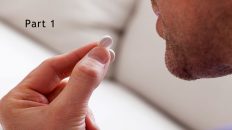By Marc Braman, MD, MPH
MB (Marc Braman, MD, MPH):
Our topic this session is “Diabetes & Relationships” and I’m joined by medical student, Marc Anderson. Thank you for helping us with some of our videos, Marc.
MA (Marc Anderson, OMS-III):
Absolutely. Glad to help.
MB:
Marc, what do you think our listeners should know about diabetes & relationships?
MA:
A lot of research has gone into looking at how the experiences and interactions we have with others can affect our health as we go through life. Can our relationships and social interactions really increase the risk of diabetes or make it worse?
MB:
Yes absolutely. The unfortunate reality is that not only do our current social situations affect our health, but research shows that our past relationships and social interactions can greatly affect our health today. Numerous studies have shown that our current and past social situations can affect our risk of disease like heart disease, obesity, depression, anxiety, substance abuse and even cancer in addition to diabetes.
MA:
That is fascinating, are there any specific examples of our past social situation increasing our risk of diseases, in particular diabetes?
MB:
Yes there are. One really powerful example of how our relationships and interactions with others can affect us in the future is Adverse Childhood Experiences or otherwise known as A.C.E. scores, in research.
MA:
What is an A.C.E. score and how does it affect our health?
MB:
Good question, an adverse childhood experience or A.C.E score is a number score for the number and type of adverse experiences that someone experiences like trauma, neglect, abuse, poverty and homelessness that a person has suffered as a child. Basically, the higher the number, the more unfortunate events and situations that person experienced as a child. High ACE scores are associated with increases in a person’s risk of numerous chronic diseases as adults. Additionally, adverse childhood experiences also significantly increase a person’s risk of things like smoking, risky behaviors, being in prison, substance abuse, anxiety and depression. If we look at diabetes, adverse childhood experiences in general raise the risk of diabetes by 32% and child neglect, the most common form of abuse, can raise the risk by as much as 92%!
MA:
Wow, what causes this to happen and how does that work?
MB:
Good question, we still have a lot to understand about the underlying processes but what we do know is that the relationships and interactions we have with our family, friends, and others can actually alter the way our genes are expressed and change the way our body functions. To illustrate, in those who have suffered significant adverse childhood experiences we consistently see high levels of certain chronic-stress related increases in triglycerides, fatty acids, insulin and glucose, all of which can contribute to metabolic syndrome and diabetes. We also see consistent differences in brain chemistry, learning and stress coping skills and people learn bad habits and dysfunctional ways of doing life. It is a complex problem with many factors involved; we hope that as we can understand more, we can better intervene and prevent these problems, giving patients the best chance for recovery and a successful life.
MA:
So how can we use relationships as part of lifestyle medicine treatment for diabetes?
MB:
Studies show that social support and emotional well-being are linked to better diabetes self-management, fewer disease complications, and better overall outcomes. Other research shows the opposite, that when these things are low, the diabetes problems are bigger. Despite this evidence, contemporary health care falls far short in sufficiently identifying and addressing these important aspects of patient care in diabetes.
Treatment can be challenging and often requires long-term interventions that may include things like personal and family therapy, social support groups, community services, and, of course, lifestyle interventions like diet, exercise, stress coping skills and sometimes substance abuse counseling in addition to medically treating the diabetes and/or other medical problems.
MA:
Wow, this is a much bigger deal than most patients or doctors realize.
MB:
Exactly, the science shows that healthy relationships and social well-being are paramount to not only mental health but also physical health. Anyone who has ever suffered a bad break up or divorce, lost a loved one, been bullied, shunned or felt alone in the world can attest to how much physical pain is felt though no physical harm is actually done. Your stomach churns, you lose your appetite and so forth. Your physiology is changed. On the positive side, the warmth of a hug, the love and support of family and friends, the connection of community and feeling like a part of something bigger than yourself makes you feel good, strong, energized. Your physiology is changing for health and for long life including improved metabolism and blood sugar control for diabetes.
MA:
Thank you, Dr. Braman. I will definitely use this information to help me treat my diabetic patients by fostering strong relationships and improving their emotional well-being.
MB:
Thank you, Marc.
Adverse Childhood Experiences and Risk of Type 2 Diabetes: A Systematic Review and Meta-analysis. Huang, Hao, Peipei Yan, Zhilei Shan, Sijing Chen, Moying Li, Cheng Luo, Hui Gao, Liping Hao, and Liegang Liu. Metabolism 64.11 (2015): 1408-418. Web. 23 Nov. 2016.
Impact of Early Psychosocial Factors (Childhood Socioeconomic Factors and Adversities) on Future Risk of Type 2 Diabetes, Metabolic Disturbances and Obesity: A Systematic Review. Tamayo, Teresa, Christian Herder, and Wolfgang Rathmann. Implications for Social Workers and Health-Care Professionals Holistic Perspectives on Trauma (2015): 283-308. Web. 23 Nov. 2016.
Childhood Trauma and Metabolic Syndrome in Men and Women. Lee, Chioun, Vera Tsenkova, and Deborah Carr. Social Science & Medicine 105 (2014): 122-30. Web. 23 Nov. 2016.
Social support and self-management capabilities in diabetes patients: An international observational study. Koetsenruijter, J., Eikelenboom, N. V., Lieshout, J. V., Vassilev, I., Lionis, C., Todorova, E., . . . Wensing, M. (2016). Patient Education and Counseling, 99(4), 638-643. doi:10.1016/j.pec.2015.10.029
Psychosocial support for people with diabetes: Past, present and future. Barnard, K. D., Peyrot, M., & Holt, R. I. (2012). Diabetic Medicine, 29(11), 1358-1360. doi:10.1111/j.1464-5491.2012.03727.x





